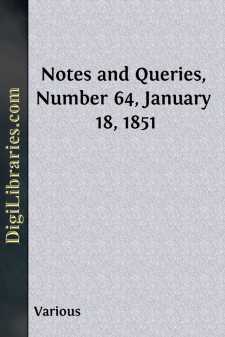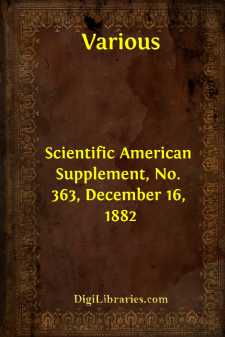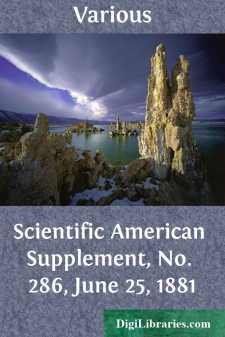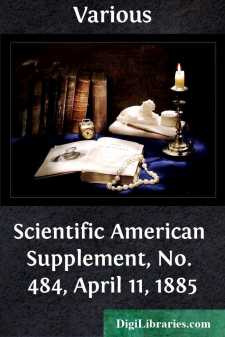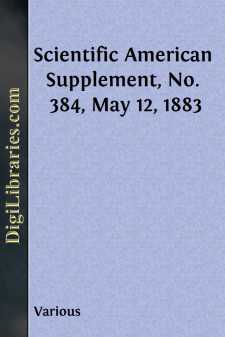Categories
- Antiques & Collectibles 13
- Architecture 36
- Art 48
- Bibles 22
- Biography & Autobiography 813
- Body, Mind & Spirit 142
- Business & Economics 28
- Children's Books 14
- Children's Fiction 11
- Computers 4
- Cooking 94
- Crafts & Hobbies 4
- Drama 346
- Education 46
- Family & Relationships 57
- Fiction 11828
- Games 19
- Gardening 17
- Health & Fitness 34
- History 1377
- House & Home 1
- Humor 147
- Juvenile Fiction 1873
- Juvenile Nonfiction 202
- Language Arts & Disciplines 88
- Law 16
- Literary Collections 686
- Literary Criticism 179
- Mathematics 13
- Medical 41
- Music 40
- Nature 179
- Non-Classifiable 1768
- Performing Arts 7
- Periodicals 1453
- Philosophy 64
- Photography 2
- Poetry 896
- Political Science 203
- Psychology 42
- Reference 154
- Religion 513
- Science 126
- Self-Help 84
- Social Science 81
- Sports & Recreation 34
- Study Aids 3
- Technology & Engineering 59
- Transportation 23
- Travel 463
- True Crime 29
Notes and Queries, Number 64, January 18, 1851
by: Various
Categories:
Description:
Excerpt
NOTES.
AUTHORSHIP OF HENRY VIII.
In my last communication on the subject of Henry VIII., I referred to certain characteristic tricks of Fletcher's style of frequent occurrence in that play, and I now beg leave to furnish you with a few instances. I wish it, however, to be understood, that I advance these merely as illustrative specimens selected at random; as there is scarcely a line of the portions of the play I assume to be Fletcher's but would furnish some evidence to a diligent student of this writer's style: and that, although I think each separate instance as strongly characteristic of Fletcher as it is unlike Shakspeare, it is only in their aggregate number that I insist upon their importance.
The first instance to which I call attention is the use of the substantive "one" in a manner which, though not very uncommon, is used by no writer so frequently as Fletcher. Take the following:—
"So great ones."—Woman's Prize, II. 2.
"And yet his songs are sad ones."—Two Noble Kinsmen, II. 4.
and the title of the play, The False One.
Compare with these from Henry VIII.:—
"This night he make a supper, and a great one."—Act I. 3.
"Shrewd ones."—"Lame ones."—"so great ones."—Ibid.
"I had my trial,
And must needs say a noble one."—Act II. 1.
"A wife—a true one."—Act III. 1.
"They are a sweet society of fair ones."—Act I. 4.
Fletcher habitually uses "thousand" without the indefinite article, as in the following instances:
"Carried before 'em thousand desolations."—False One, II. 9.
"Offers herself in thousand safeties to you."—Rollo, II. 1.
"This sword shall cut thee into thousand pieces."—Knight of Malta, IV. 2.
In Henry VIII. we have in the prologue:
"Of thousand friends."
"Cast thousand beams upon me."—Act IV. 2.
The use of the word "else" is peculiar in its position in Fletcher:—
"'Twere fit I were hang'd else."—Rule a Wife, II.
"I were to blame else."—Ibid.
"I've lost me end else."—Act IV.
"I am wide else."—Pilgrim, IV. 1.
In Henry VIII., the word occurs in precisely the same position:—
"Pray God he do! He'll never know himself, else."—Act II. 2.
"I were malicious, else."—Act IV. 2.
The peculiarly idiomatic expression "I take it" is of frequent occurrence in Fletcher, as witness the following:—
"This is no lining for a trench, I take it."—Rule a Wife, III.
"And you have land i' th' Indies, as I take it."—Ibid. IV.
"A fault without forgiveness, as I take it."—Pilgrim, IV. 1.
"In noble emulation (so I take it)."—Ibid. IV. 2.
In one scene of Henry VIII., Act I. 3., the expression occurs twice: "One would take it;" "There, I take it."
Of a peculiar manner of introducing a negative condition, one instance from Fletcher, and one from Henry VIII. in reference to the same substantive, though used in different senses, will suffice:
"All noble battles,
Maintain'd in thirst of honour, not of blood."—Bonduca, V. 1.
"And those about her
From her shall read the perfect ways of honour,
And by those claim their greatness, not by blood."—Henry VIII., V....


